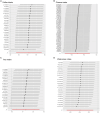The role of dietary preferences in osteoarthritis: a Mendelian randomization study using genome-wide association analysis data from the UK Biobank
- PMID: 38742020
- PMCID: PMC11089188
- DOI: 10.3389/fnut.2024.1373850
The role of dietary preferences in osteoarthritis: a Mendelian randomization study using genome-wide association analysis data from the UK Biobank
Abstract
Background: To understand the impact of individual preferences for specific dietary items on OA, and to help inform the development of effective and targeted OA prevention and management strategies, we performed a Mendelian randomization analysis between dietary preferences and osteoarthritis.
Methods: This study utilized genetic data from the UK Biobank to investigate the association between OA and 21 different common dietary items. Instrumental variables representing European populations were carefully selected based on their genetic significance and linkage disequilibrium. In cases where a dietary item had few relevant genetic markers, a more lenient selection threshold was applied. To prevent bias, the analysis excluded single nucleotide polymorphisms (SNPs) associated with factors such as body mass index (BMI) and cholesterol. Using inverse-variance weighting (IVW) and Mendelian randomization, significant associations were detected between certain dietary items and OA.
Results: Using Mendelian randomization to examine the relationship between 21 different dietary items and OA, significant associations were found for coffee, peas, watercress, and cheese, where the first two had a promoting effect and the last two an inhibiting effect on OA. Due to heterogeneity in the test results for cheese, a random IVW representation was used. The results of sensitivity analysis showed no significant heterogeneity or horizontal pleiotropy in the selected SNPS, demonstrating the reliability of Mendelian randomization analysis.
Conclusion: This study identified coffee, peas, watercress, and cheese as food items that may have significant dietary effects on osteoarthritis. This information may be useful to consider in the development of OA management strategies.
Keywords: Mendelian randomization; SNP; causality; dietary preferences; osteoarthritis.
Copyright © 2024 Chen, Su, Li, Yang, Li and Xing.
Conflict of interest statement
The authors declare that the research was conducted in the absence of any commercial or financial relationships that could be construed as a potential conflict of interest.
Figures




Similar articles
-
No genetic causal association between circulating alpha-tocopherol levels and osteoarthritis, a two-sample Mendelian randomization analysis.Sci Rep. 2024 May 2;14(1):10099. doi: 10.1038/s41598-024-60676-5. Sci Rep. 2024. PMID: 38698019 Free PMC article.
-
Genetic Causal Association between Iron Status and Osteoarthritis: A Two-Sample Mendelian Randomization.Nutrients. 2022 Sep 6;14(18):3683. doi: 10.3390/nu14183683. Nutrients. 2022. PMID: 36145059 Free PMC article.
-
Plasma lipids, alcohol intake frequency and risk of Osteoarthritis: a Mendelian randomization study.BMC Public Health. 2023 Jul 11;23(1):1327. doi: 10.1186/s12889-023-16250-1. BMC Public Health. 2023. PMID: 37434151 Free PMC article.
-
Causal Association of Coffee Consumption and Total, Knee, Hip and Self-Reported Osteoarthritis: A Mendelian Randomization Study.Front Endocrinol (Lausanne). 2021 Nov 10;12:768529. doi: 10.3389/fendo.2021.768529. eCollection 2021. Front Endocrinol (Lausanne). 2021. PMID: 34858340 Free PMC article.
-
Does Walking Have an Association with Osteoarthritis? A Two-Sample Mendelian Randomization Analysis.Clin Interv Aging. 2024 Jan 31;19:153-161. doi: 10.2147/CIA.S442259. eCollection 2024. Clin Interv Aging. 2024. PMID: 38312845 Free PMC article. Review.
References
LinkOut - more resources
Full Text Sources

